Our big list of sleep supplements provides in-depth information on specific sleep aids, including their effects on physical and mental functions in the human brain and body.
Sleep is essential for optimum physical and mental performance in everyday life. Ancient civilizations realized this ages ago, and it prompted them to seek out sleep aids from natural resources.
Nowadays, it is much more difficult to relax, let alone sleep in this fast-paced, multitasking world we live in. We are constantly juggling stress, work, exercise, relationships, social media, etc. Wouldn’t it be nice to sleep through the night without trying so hard?
We think so too. That’s why we’ve compiled this detailed list of sleep supplements for those who can’t settle down when bedtime comes. Below, we will discuss the effects of different sleep aids on our brains and bodies. Read on for more information.

https://www.consumerreports.org/sleep/why-americans-cant-sleep/
Some sleep supplements come from natural resources like plants, amino acids, minerals and other compounds produced naturally in the body. Unlike synthetic sleeping pills, natural sleep supplements initiate little to no adverse side effects and we can easily purchase them without a prescription.
Furthermore, scientific evidence supports the effects of sleep aids in animal tests and human clinical trials. Here are the effects of popular sleep supplements on the market today:
- Influence neurotransmitter GABA synthesis, uptake and release
- Induce muscle relaxation
- Support circadian rhythm and improve sleep patterns
- Inhibit the effects of adrenaline and noradrenaline
- Reduce the activity of excitatory neurons
While sleep supplements can elicit these effects, there are many different kinds of sleep aids out there. Thus, in this list of sleep supplements, we’ll explain each one to help you determine which ingredients will benefit you the most.
If you’re looking for more information on sleep products and brands, check out our guide on the best sleep supplements of 2018.
Table of Contents
Ashwagandha (Withania somnifera)

Withania somnifera By JMK [GFDL or CC BY-SA 3.0], via Wikimedia Commons
As an herbal sleep aid, ashwagandha may:
- Activate receptors for the calming neurotransmitter gamma-aminobutyric acid (GABA)
- Reduce anxiety
- Promote quality sleep
We all know it’s difficult to sleep when we’re stressed out. However, taking ashwagandha before bed can improve sleep by relieving stress and anxiety. In summation, it influences brain chemicals to relax the mind and body, which enhances sleep quality.
California Poppy (Eschscholzia californica)
California poppy is a medicinal herb and popular sedative in North America. It is known to induce sleep and relieve anxiety. It’s also a known nootropic since it supports brain health and ameliorates certain brain disorders.
As a sleep aid, California poppy is often mixed with other popular herbal sedatives such as passionflower, valerian, hops and chamomile. However, research on California poppy as a sleep aid is still in its early stages. As such, you may want to take this sleep supplement moderately for now.
Cannabidiol (CBD)
Cannabidiol (CBD) comes from the marijuana plant Cannabis Sativa. However, CBD does not possess any psychoactive properties, unlike the popular marijuana-derived compound tetrahydrocannabinol (THC).
That’s right, CBD does not contain THC, and is therefore not psychoactive. This means it will not show up as cannabis on a drug test. In addition, CBD has plenty of health benefits for the mind and body. As a sleep aid, CBD:
- Modulates neurotransmitter serotonin
- Regulates mood and emotion
- Reduces stress and anxiety
- Promotes neurogenesis during sleep
Stress and anxiety are two of the most common causes of sleep problems. However, CBD can counteract both simultaneously while promoting relaxation, which induces sleep. Keep in mind, though, that CBD dosages vary depending on the user.
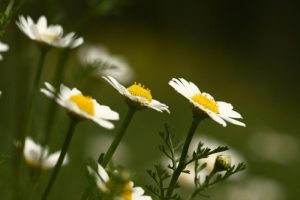
Chamomile by באדיבות אתר האינטרנט “צמח השדה” [CC BY 2.5], via Wikimedia Commons
Chamomile – Highly Recommended
Often present in tea, Chamomile is one of the most popular, ancient herbal sleeping aids on the market. The calming effects of chamomile are primarily due to the presence of apigenin in it. Apigenin is a flavonoid that can reduce anxiety and induce sleep.
Apigenin does so by binding with GABA and benzodiazepine receptors to help calm the brain. Chamomile actually competes with the most commonly prescribed sleeping pill on the market: benzodiazepine. They have similar effects, except chamomile is all-natural with no unwanted side effects.
As a sleep aid, we know a lot about chamomile since it’s been around for so long. However, research suggests that chamomile might be more than just a sedative and scientists are still testing theories on other benefits.
Glycine
Glycine is a non-essential amino acid that is produced in the body. It is also manufactured as a sweetener.
As a sleeping aid, glycine mimics the function of certain neurotransmitters and binds to their respective receptors. Primarily, glycine binds with the N-methyl-D-aspartate (NDMA) receptor, which induces sleep.
In addition, glycine boosts serotonin levels to further improve sleep quality. All in all, glycine is a promising sleep supplement that we can absorb easily.
Hops (humulus lupulus)
Hops are relatively mild sedatives that come from the seed cones or strobiles of the hop plant. As a sleeping aid, hops are known to ameliorate anxiety, restlessness and insomnia.
However, it’s unclear exactly how hops work as a sleeping aid. Scientists hypothesize that it increases the neurotransmitter GABA to induce sleep and relaxation. Regardless, studies show it is an effective sleep supplement.
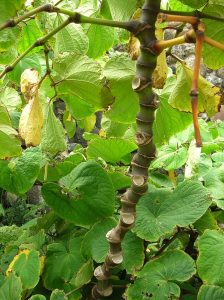
Piper methysticum by Forest & Kim Starr [CC BY 3.0], via Wikimedia Commons
Kava Kava (Piper Methysticum)
Kava kava comes from the roots of Piper Methysticum. It is a popular ceremonial and recreational drink of local Pacific Islanders.
In general, kava can improve mood and induce relaxation. It is also a nootropic that can enhance cognitive performance.
As a sleep aid, kava initiates the binding of the inhibitory neurotransmitter GABA to its receptors, which leads to a calming effect. In addition, it inhibits the effects of the neurotransmitter noradrenaline, which causes alertness.
Kava kava has also shown to reduce anxiety. However, research on the effects of it as a sleep aid is still in its early stages. Nevertheless, kava has well-known calming effects that can help promote sleep.
Lemon Balm (Melissa officinalis)
Lemon balm is a popular herbal ingredient in toothpaste and perfume. It’s also a member of the mint family that provides a calming effect when ingested.
We’re not sure exactly how lemon balm elicits its calming effects. However, here are the known benefits of lemon balm when used as a sleep supplement:
- Acts as an adaptogen that enhances the quality of sleep despite stressful conditions
- Minimizes the effects of insomnia and anxiety
- Calms all senses to induce a calm state of mind
As a sleep supplement, lemon balm is definitely effective. However, its mode of action is somewhat unclear. Thus, it may be smart to take it in moderation and avoid mixing it with other drugs. However, people do often mix lemon balm with valerian in tea to further enhance its calming effects.
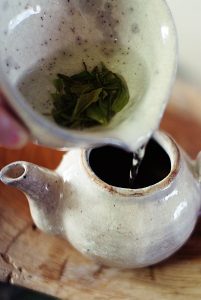
GreenTea By 장미의 뜰 [CC BY 2.0 kr], via Wikimedia Commons
L-Theanine – Highly Recommended
L-Theanine is the primary antioxidant, nootropic and psychoactive ingredient found in tea. It is known to induce relaxation, reduce stress and ultimately help improve sleep habits.
Like most sleep aids, L-Theanine modulates GABA activity to inhibit the activity of excitatory nerve cells. Clinical trials suggest L-Theanine promotes sleep in direct and/or indirect ways.
The relaxing herb L-Theanine is also an effective sleep aid for patients with hypertension and anxiety disorders when taken regularly. Overall, it can enhance sleep quality, sharpen cognition and promote overall health.
L-Tryptophan – Highly Recommended
L-Tryptophan is an essential amino acid that primarily comes from protein-rich dietary sources. It acts as a precursor for the neurotransmitters serotonin and melatonin in the brain, both of which are essential in regulating sleep.
Research has shown that L-Tryptophan can enhance sleep latency and sleep quality. All in all, regular intake of L-tryptophan can not only improve sleep, but it can improve overall health.
Magnesium
Magnesium is an essential mineral for the body that comes from dietary sources and supplements. It plays an important role in different biochemical reactions in the body.
As a sleep aid, magnesium enables muscle relaxation so we can rest physically and mentally. Oftentimes, our muscles become tense and tight when we are stressed or anxious. This can negatively affect our sleep quality. However, taking magnesium before bed consistently can help initiate total physical and mental relaxation for the best sleep you’ve had in a while.
Not only does magnesium affect the body, but it also affects the mind. It can reduce stress and anxiety by stimulating GABA receptors in the brain, ultimately leading to an instant calming effect.
Moreover, magnesium can inhibit NMDA receptors to limit brain activity during sleep. Overall, it is a safe sleep aid that is easy to obtain and can increase sleep quality in a number of ways.
Magnolia officinalis
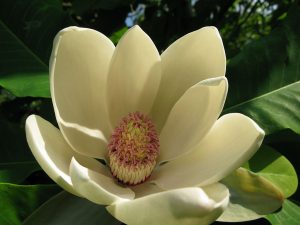
Magnolia officinalis By Karlostachys [CC BY-SA 3.0], via Wikimedia Commons
Recently, however, people have been using it as a sleep aid. It is hypothesized that Magnolia officinalis can reduce anxiety by activating GABA receptors that inhibit nerve impulses.
In addition, Magnolia officinalis may suppress the effects of the hormone adrenaline, which is what triggers a flight or fight response in the body.
However, the effects of Magnolia officinalis as a sleep aid have yet to be demonstrated directly in clinical trials. The most researched effects of Magnolia officinalis on humans are its anxiolytic and anti-stress effects, which may be what leads to its effectiveness as a sleep supplement.
Melatonin – Highly Recommended
Melatonin is the main neurotransmitter responsible for regulating our bodies’ circadian rhythm and sleep patterns. In other words, it helps us sleep. Our brains secrete melatonin via the pineal gland or epiphysis in response to darkness. At least they’re supposed to.
The popularity of melatonin as a sleep supplement might be due to the prevalence of high-stress in our society, which can prevent us from secreting melatonin and sleeping well. The sleep hormone melatonin can induce sleep despite stress, ultimately reducing sleep problems associated with stress.
Here are the known benefits of melatonin as a sleep aid:
- Shortens the amount of time to fall asleep (sleep onset latency)
- Supports sleep adaptation to time zone changes, jet lag or shifting work hours
- Suppresses the effects of sleep problems
- Increases sleep quality and duration
In addition, melatonin is a popular alternative to sleeping pills because it does not elicit adverse effects and is less likely to cause dependence or addiction than other sleep aids. Melatonin supplements are also easy to obtain without a prescription.
Ornithine
Ornithine is a non-essential amino acid that is naturally produced in our bodies. It is a by-product of arginine, which is involved in the urea cycle.
Ornithine is a popular supplement among athletes and bodybuilders because it may enhance physical performance. In addition, ornithine is known to elicit anti-stress and calming effects by promoting GABA activity. However, as a sleep aid, research on ornithine is limited.
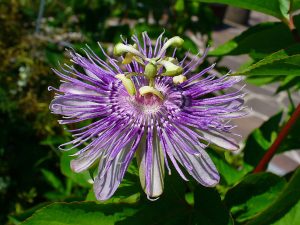
Passiflora incarnata By H. Zell [GFDL or CC BY-SA 3.0], via Wikimedia Commons
Passionflower (Passiflora incarnata)
Passionflower is a North American medicinal plant that is famous for its calming properties. It’s known to alleviate insomnia, nervousness and anxiety.
Research suggests that passionflower promotes sleep by increasing GABA levels and reducing neuron activities. Passionflower has also shown to enhance sleep quality.
However, this research only observed the effects of short-term passionflower tea consumption. Therefore, if you want to use passionflower as a sleep aid, you may want to ingest it in tea form for now. All in all, it is a natural, safe and effective sleeping aid with no adverse effects.
Skullcap (Scutellaria lateriflora)
Skullcap is an herbal remedy for anxiety and sleep problems. Its two derivatives baicalin and baicalein are known to activate GABA receptors to induce a calming effect despite stress.
In addition, skullcap improves mood in healthy adults. As a sleep aid, skullcap seems to have an indirect effect on sleep quality by reducing stress and anxiety. In fact, animal trials do suggest that baicalin from skullcap improves sleep and wake regulation in rats. Therefore, it may have the same effects on humans, too.
St. John’s Wort (Hypericum perforatum)
St. John’s Wort has been a popular herbal remedy since the Classical period. It offers a wide range of medicinal properties.
For example, St. John’s wort was initially used to cure skin wounds and mental issues. However, research suggests it promotes deep sleep, too. Here are the benefits of St. John’s wort as a sleeping supplement:
- Stimulates GABA receptors
- Reduces oxidative stress
- Enhances deep sleep
- Reduces depression and anxiety to improve sleep
Keep in mind, however, that St. John’s Wort may interact with other herbal extracts or synthetic medications when taken together. In addition, while St. John’s wort may work well as a sleep aid, there is little evidence supporting its effect on humans to date.
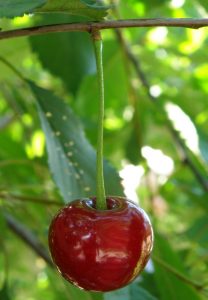
Tart Cherry By Alina Zienowicz Ala z [CC BY-SA 3.0], via Wikimedia Commons
Tart Cherry (Prunus cerasus) – Highly Recommended
Tart cherries are a common ingredient in fruit punch and cake. But did you know they’re an effective sleep aid too?
Well, tart cherries are a natural source of the neurotransmitter melatonin and the amino acid tryptophan. Both of these are vital in regulating circadian rhythm and sleep patterns.
Not to mention, tart cherries are also a popular workout supplement, testosterone booster and antioxidant. Overall, they’re a natural sleep supplement that offers various other health benefits.
Valerian (Valeriana officinalis)
Valerian is a popular all-in-one herbal remedy dating back to ancient Greece and Rome. Evidence suggests it is a sedative and nootropic.
Moreover, valerian is often infused with other natural sedatives in the form of tea. It has a calming effect strong enough to induce sleep, hence why it’s an effective sleep aid. Here are the mechanisms of action of valerian in inducing relaxation and promoting sleep:
- Increases GABA levels to alleviate stress, anxiety and insomnia
- Reduces the breakdown of GABA
- Facilitates GABA reuptake
As you can see, valerian is a practical sleep aid that can specifically support GABA synthesis, uptake and release. However, scientists should carry out further clinical trials on a larger scale to confirm its calming effects. Nevertheless, valerian may improve sleep latency and overall sleep quality.
Leave a Reply